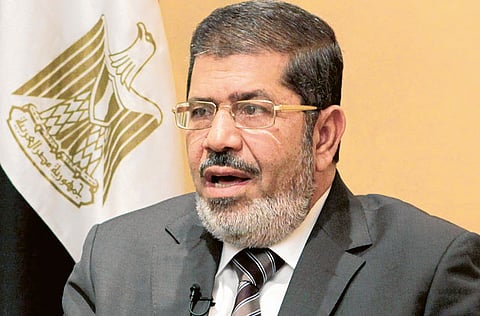A US-Islamist love-in in Egypt
Clinton’s Egypt trip is part of new US stance to the changing order in Mideast

According to the latest conspiracy theory in Cairo, Mohammad Mursi, Egypt’s first Islamist President, won the election not because of popular appeal but thanks to Washington’s backing. In fact, the theory holds. America has now picked its new allies in the Middle East — and they are the Muslim Brotherhood.
This extraordinary love-in — US and the Islamists only got to know each other after the fall of the Hosni Mubarak regime in February 2011 — is infuriating Egypt’s liberals, some of whom protested outside Hillary Clinton’s hotel during her Cairo visit last week. Their banners demanded that the US “stop funding for the Muslim Brotherhood”.
For more than a decade after the September 11, attacks, the US was accused of waging war on Islam and everything Islamist, so having a friendship with the likes of the Brotherhood is a change for the better. The US, of course, does not fund the Brotherhood and it is safe to assume it never will. It does, however, provide $1.3 billion (Dh4.78 billion) a year in assistance to the Egyptian generals who are trying to contain the Brotherhood’s powers.
But the US owes its standing to what many Arabs have a problem believing — that it is in favour of what the ballot box produces, even if it is not entirely in its interest. Clinton’s trip to Egypt was part of the American adaptation to the changing order in the Middle East. Since the onset of the Arab uprising, Washington has grappled for a policy to replace its reliance on the autocratic, but accommodating former friends such as Mubarak and Tunisia’s Zine Al Abidine Bin Ali.
True, it gave the lead role in Libya to France and the UK and it has fumbled on Syria, terrified of a risky military intervention and unable to win Russian support for a political transition from Bashar Al Assad’s rule. It has been of two minds about arming the opposition — not standing in the way of Arab allies providing weapons, but publicly also voicing doubts about the effort and insisting that more weapons to the rebels would fuel an even wider civil war.
But in both Egypt and Tunisia, the US has played its hand in the transitions rather well, recognising that if it wants to remain relevant and have influence, it has to deal with the emerging political forces.
Islamists have helped, too. They have acknowledged the need for western assistance at a time of economic hardship. Both, Tunisia’s Al Nahda party and Egypt’s Muslim Brotherhood have reached out to Europe and the US, sending delegations on a charm offensive. A western diplomat in Cairo says the Brotherhood has indicated that it is also open to security advice from some European states.
Clinton landed in Cairo in the midst of an intense power struggle between Mursi and the generals intent on a power grab to protect their interests. She carefully weighed her words, calling for a “full transition to civilian rule with all it entails”, but without antagonising the military or hinting the US would withhold assistance to the generals.
A cautious approach makes sense at this stage, but Washington must also be ready to use its financial leverage with the generals more forcefully if they step up their obstruction of the democratic transition. There can be no illusion, moreover, about the Brotherhood or the fact that the relationship is likely to become trickier, not least on foreign policy.
No one in Egypt will rip apart the peace treaty with Israel, but the Brotherhood is not alone among domestic political forces in considering that Israel is not abiding by its commitment and the treaty might need to be reviewed.
The US will also face questions on how to respond to the Islamists’ social agenda. Mainstream Islamist parties will want to influence social norms and they are under pressure from the ultraconservative Salafist forces to impose stricter rules, particularly on women’s rights.
The US can happily coexist with deeply conservative governments — consider its marriage of convenience with Saudi Arabia. But in countries in transition, its emphasis has to remain on promoting the democratic process, not assuming that Islamists who have won elections will monopolise the seat of power.
In most corners of the Arab world, liberals who look to Washington for support — and are the West’s more natural allies — are still weak. But they cannot be written off. The experience of Libya is instructive: In the country’s first democratic parliamentary elections this month, the Islamists suffered a humiliating defeat against liberals led by a former rebel leader, Mahmoud Jibril.
Unusually, the liberals were well organised in a grand coalition and they fought an effective campaign. Their victory has given other liberal-minded groups in the region hope of what is possible to achieve.
Islamists remain the more powerful political force today in much of the region — and they are one of the main opposition groups fighting to topple the Syrian regime. But while they represent an important segment of society, their staying power and ability to govern is only now starting to be tested. In calibrating policy towards emerging Arab democracies, the US should be supporting elected institutions — working with Islamists on the one hand, but not alienating the anxious liberals on the other.
— Financial Times



